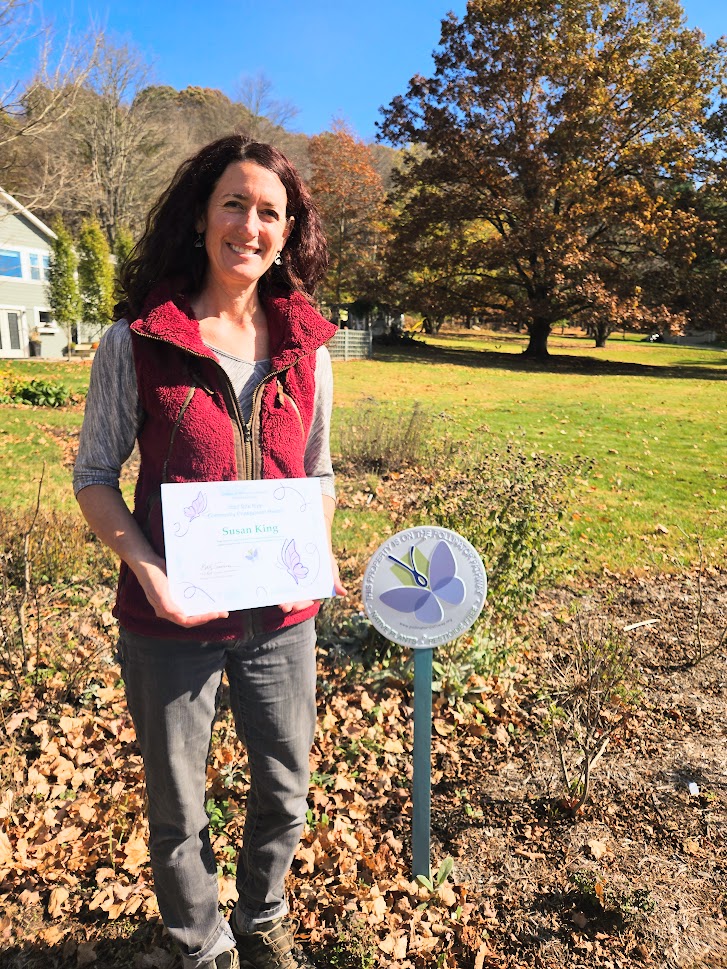As Susan King faced one of the biggest personal challenges of her life, she immersed herself even more in her Licking County community.
The Granville resident championed a local initiative to sustain endangered monarch butterflies, bees and birds. She provided creative leadership for the Ace of Clubs 4-H club. She volunteered with the League of Women Voters. She joined a group that hikes and does volunteer work in the Denison University Bio-Reserve. With her husband, Jeremy, she promoted environmental protection and sustainability. She volunteered with the Licking Land Trust with several programs. She helps at Granville Intermediate School, where their son, JB, is a fifth grader.
And she did all of that and more while battling breast cancer, which gave her a new perspective about the importance of being involved in the community.
“It was something that scares you, and reminds you of your mortality, and reminds you of what matters,” Susan King said. “What is the legacy that I’m going to leave to my son?”
She finds peace in nature and her gardens, she said.
“There are so many issues that I care about in this world, and I find that a lot of them can be really overwhelming and anxiety-provoking,” she said. “Whether it’s climate change, whether it’s the war in the Middle East … being in a garden and digging, [I can] focus on the part I can impact.”
Sign up here for a weekly newsletter from The Reporting Project.
In November, the League of Women Voters of Licking County awarded King, 49, with the Rita Kipp Community Engagement Award for her service to the environment, her work planting to aid pollinators, and her emphasis on growing native plants.
“Our committee had no trouble picking her for this award,” said League of Women Voters member Carol Apacki. “She has hit the ground running and we are all learning from Susan.”
This is the first time the League has awarded the Rita Kipp Award, named for the organization’s past president and which is designated for someone who contributed non-partisan advocacy, community organizing and/or civic engagement.
Apacki called King “uniquely outstanding,” and said the award went to someone who does exceptional work in the community.
King has been involved with the League of Women Voters of Licking County for the past three years, currently sits on the League’s board, and helped design the organization’s website.
An Ohio native, King graduated from Denison University, where she majored in environmental studies. She and her husband spent two years in Ecuador as members of the Peace Corps before they returned to Granville in 2009.
Susan said she always loved flowers, and after their stint in Ecuador, she started a flower business with her mom, where they grew sustainable flowers for weddings and special events.
Her interest in plants and the environment led her in February to help create the local branch of Pollinator Pathway, with the goal of planting more native plants, removing invasive plants and supporting pollinators like bees, butterflies and birds.
Pollinator Pathway, a nonprofit organization with local branches across the country, was launched at the national level in 2016. Since Susan launched the local Pollinator Pathway, she has helped co-sponsor and organize events, including native plant sales and a plant swap at the Granville Public Library.
Her emphasis on native plants, she said, helps with local environmental biodiversity and sustainability. Part of that work means removing invasive species like the Callery pear tree that outcompete native plants and make it harder for local pollinators to feed.
“It’s hard to look around here and be like ‘uh, there’s a few things here that are problematic,’” she said. “Once you see them, you can’t unsee them.”
Currently, King is working to root out a bounty of the Callery pear, also known as Bradford pear. The invasive tree crowds out the other plants and trees that should be in the region.
“This was a tree that was originally introduced as an ornamental street tree … because it is fast-growing and it has flowers,” King said. “But it’s from Asia, and it’s crossed with other pears and it became a weed. And now it is taking over natural areas.”
The reward for removing a Callery pear tree is a free, native, pollinator-friendly tree, King said.
Now, she focuses more on gardening, working in small plots like backyards, to help support local pollinator populations. Some pollinators, particularly wild bees, can only go so far to collect pollen, she said, so working in backyards or other small spaces can have a significant impact.
A good example is the butterfly milkweeds the 4H club planted outside the Granville Public Library. Milkweeds are host plants for endangered monarch butterflies, and they flocked to the little garden.
The butterflies, which have seen an 85% decline in population over the last 20 years, laid eggs all over the plants, and within weeks, the milkweed garden was crawling with caterpillars.
“It became a tourist attraction,” King said.
There were so many caterpillars that they stripped the leaves in short order, so King brought in more milkweed plants to feed the hungry, hungry caterpillars. She made sure each one had the chance to turn into a monarch butterfly.
“It was an amazing example of [how] even the smallest plot could have the biggest impact,” she said.
It also is another example of how one person filled with passion can make a difference in her community.

